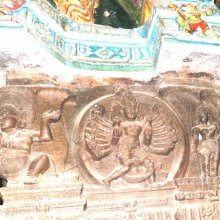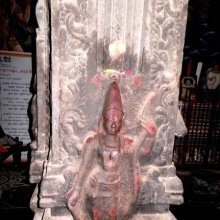Cakrapani, Cakrapāṇi, Cakrapāṇī, Cakra-pani: 13 definitions
Introduction:
Cakrapani means something in Hinduism, Sanskrit, Marathi. If you want to know the exact meaning, history, etymology or English translation of this term then check out the descriptions on this page. Add your comment or reference to a book if you want to contribute to this summary article.
Alternative spellings of this word include Chakrapani.
Images (photo gallery)
In Hinduism
Purana and Itihasa (epic history)
Source: Cologne Digital Sanskrit Dictionaries: The Purana IndexCakrapāṇi (चक्रपाणि).—Declared the law re. ekoddiṣṭa; was asked to give up sleep for the churning of the ocean.*
- * Matsya-purāṇa 18. 1; 20. 38; 249. 14.

The Purana (पुराण, purāṇas) refers to Sanskrit literature preserving ancient India’s vast cultural history, including historical legends, religious ceremonies, various arts and sciences. The eighteen mahapuranas total over 400,000 shlokas (metrical couplets) and date to at least several centuries BCE.
Shaktism (Shakta philosophy)
Source: Google Books: ManthanabhairavatantramCakrapāṇi (चक्रपाणि) (cf. Cakra) refers to “one who holds a discus” and represents one of the attributes of Viṣṇu, according to the second recension of the Yogakhaṇḍa of the Manthānabhairavatantra, a vast sprawling work that belongs to a corpus of Tantric texts concerned with the worship of the goddess Kubjikā.—Accordingly: “[...] Then, after the goddess Kumārikā had heard Vyāsa’s words, she hid her Māyā nature from him and assumed (her) Vaiṣṇava form. Viṣṇu held a conch, discus (cakra—cakrapāṇi), mace and rosary [śaṅkhacakragadāpāṇiḥ akṣasūtraṃ]. Stainless (nirañjana), he wore yellow clothes and, mounted on Garuḍa, he was radiant. Keśava, that is, Janārdhaka, was accompanied by Mahālakṣmī. (He), the god Hari, born from a lotus womb, is the imperishable cause (of all things). [...]”.

Shakta (शाक्त, śākta) or Shaktism (śāktism) represents a tradition of Hinduism where the Goddess (Devi) is revered and worshipped. Shakta literature includes a range of scriptures, including various Agamas and Tantras, although its roots may be traced back to the Vedas.
Ayurveda (science of life)
Agriculture (Krishi) and Vrikshayurveda (study of Plant life)
Source: Asian Agri-History: Drumavichitrikaranam—The Ancient Approach to Plant MutagenesisCakrapāṇi (चक्रपाणि) (1580 CE) is the author of the Viśvavallabha-Vṛkṣāyurveda: an encyclopedic work also dealing with ancient Indian agriculture and Plant Mutagenesis (druma-vichitrikaranam). This term means “to make a tree appear extraordinary”. In other words, the term implies that there would be an alteration in the natural trait of the tree. Certain treatises contain a separate chapter on Plant Mutagenesis (druma-vicitrīkaraṇa), such as Cakrapāṇi-Miśra’s Viśvavallabha-Vṛkṣāyurveda (1580 CE).

Āyurveda (आयुर्वेद, ayurveda) is a branch of Indian science dealing with medicine, herbalism, taxology, anatomy, surgery, alchemy and related topics. Traditional practice of Āyurveda in ancient India dates back to at least the first millenium BC. Literature is commonly written in Sanskrit using various poetic metres.
Languages of India and abroad
Marathi-English dictionary
Source: DDSA: The Molesworth Marathi and English Dictionarycakrapāṇi (चक्रपाणि).—a S Bearing in hand the cakra or discus;--epithet of Vishn̤u.
Marathi is an Indo-European language having over 70 million native speakers people in (predominantly) Maharashtra India. Marathi, like many other Indo-Aryan languages, evolved from early forms of Prakrit, which itself is a subset of Sanskrit, one of the most ancient languages of the world.
Sanskrit dictionary
Source: DDSA: The practical Sanskrit-English dictionaryCakrapāṇi (चक्रपाणि).—an epithet of Viṣṇu; Bhagavadgītā (Bombay) 11.49.
Derivable forms: cakrapāṇiḥ (चक्रपाणिः).
Cakrapāṇi is a Sanskrit compound consisting of the terms cakra and pāṇi (पाणि).
Source: Cologne Digital Sanskrit Dictionaries: Shabda-Sagara Sanskrit-English DictionaryCakrapāṇi (चक्रपाणि).—m.
(-ṇiḥ) A name of Vishnu. E. cakra and pāṇi the hand, being always represented with a discus in one hand.
Source: Cologne Digital Sanskrit Dictionaries: Benfey Sanskrit-English DictionaryCakrapāṇi (चक्रपाणि).—m. a name of Viṣṇu (holding a discus in one hand).
Cakrapāṇi is a Sanskrit compound consisting of the terms cakra and pāṇi (पाणि).
Source: Cologne Digital Sanskrit Dictionaries: Aufrecht Catalogus Catalogorum1) Cakrapāṇi (चक्रपाणि) as mentioned in Aufrecht’s Catalogus Catalogorum:—poet. [Sūktikarṇāmṛta by Śrīdharadāsa] Padyāvalī.
2) Cakrapāṇi (चक्रपाणि):—Kālakaumudīcampū. Bp. 262.
3) Cakrapāṇi (चक्रपाणि):—Jyotirbhāskara jy. L. 2825. Vijayakalpalatā jy. H. 330. Bp. 273.
4) Cakrapāṇi (चक्रपाणि):—Prauḍhamanoramākhaṇḍana [grammatical] Sb. 441.
5) Cakrapāṇi (चक्रपाणि):—read Kalākaumudīcampū.
6) Cakrapāṇi (चक्रपाणि):—son of Satyadhara: Praśnatattva jy.
7) Cakrapāṇi (चक्रपाणि):—Viṣṇustotra.
8) Cakrapāṇi (चक्रपाणि):—son of Kāmarāja, grandson of Vāsudeva: Vijayakalpalatā jy.
9) Cakrapāṇi (चक्रपाणि):—pupil of Viśveśvara or Vīreśvara: Kārakatattva [grammatical]
Cakrapāṇi has the following synonyms: Śeṣacakrapāṇi.
Source: Cologne Digital Sanskrit Dictionaries: Monier-Williams Sanskrit-English Dictionary1) Cakrapāṇi (चक्रपाणि):—[=cakra-pāṇi] [from cakra] m. ‘discus-handed’, Viṣṇu, [ṢaḍvBr. v, 10; Mahābhārata vi, 1900]
2) [v.s. ...] (ṇin), [Harivaṃśa 8193 and 8376]
3) [v.s. ...] Name of a medical author
Source: Cologne Digital Sanskrit Dictionaries: Yates Sanskrit-English DictionaryCakrapāṇi (चक्रपाणि):—[cakra-pāṇi] (ṇiḥ) 2. m. Vishnu.
[Sanskrit to German]
Sanskrit, also spelled संस्कृतम् (saṃskṛtam), is an ancient language of India commonly seen as the grandmother of the Indo-European language family (even English!). Closely allied with Prakrit and Pali, Sanskrit is more exhaustive in both grammar and terms and has the most extensive collection of literature in the world, greatly surpassing its sister-languages Greek and Latin.
Kannada-English dictionary
Source: Alar: Kannada-English corpusCakrapāṇi (ಚಕ್ರಪಾಣಿ):—[noun] = ಚಕ್ರಧರ - [cakradhara -] 1.
Kannada is a Dravidian language (as opposed to the Indo-European language family) mainly spoken in the southwestern region of India.
See also (Relevant definitions)
Starts with: Cakrapani dikshita, Cakrapani mishra, Cakrapani pandita, Cakrapanibhatta, Cakrapanidasa, Cakrapanidatta, Cakrapanijaya, Cakrapanikavya, Cakrapanimishra, Cakrapanin, Cakrapanishesha, Cakrapanistotra.
Ends with: Dikshita cakrapani, Shankhacakrapani, Sheshacakrapani.
Full-text (+74): Cakrapanin, Cakrapanidatta, Sheshacakrapani, Praudhamanoramakhandana, Cakkirapani, Shankhacakrapani, Prashnatattva, Cakrapani mishra, Kalakaumudicampu, Vijayakalpalata, Cakrapani dikshita, Satyadhara, Vyavaharadarsha, Cakrapani pandita, Jyotirbhaskara, Karakatattva, Dikshita cakrapani, Hari kavi, Sarvasatvaruta, Kondani.
Relevant text
Search found 21 books and stories containing Cakrapani, Cakra-pani, Cakra-pāṇi, Cakra-pāṇī, Cakrapāṇi, Cakrapāṇī; (plurals include: Cakrapanis, panis, pāṇis, pāṇīs, Cakrapāṇis, Cakrapāṇīs). You can also click to the full overview containing English textual excerpts. Below are direct links for the most relevant articles:
Philosophy of Charaka-samhita (by Asokan. G)
Spiritual attributes (ātma-guṇas) < [Chapter 2 - Fundamental Categories]
Heuristic reasoning (yukti) [in Charaka philosophy] < [Chapter 6 - Source of Knowledge (pramāṇa)]
Mind [in Charaka philosophy] < [Chapter 5 - The Complete Man]
History of Indian Medicine (and Ayurveda) (by Shree Gulabkunverba Ayurvedic Society)
Chapter 10 - The Pupils of Atreya < [Part 1 - The History of Medicine in India]
Chapter 9 - Commentators of Caraka Samhita < [Part 1 - The History of Medicine in India]
Chapter 5 - The Story of Agnivesha < [Part 1 - The History of Medicine in India]
Śrī Kṛṣṇa-vijaya (by Śrī Gunaraja Khan)
Chapter 5 - Kuvera's Two Sons Offer Prayers to Lord Kṛṣṇa (Vibhāṣā-rāga)
Chapter 6 - Prayers by the Wives of Kāliya-nāga (Dhānasi-rāga)
Brihad Bhagavatamrita (commentary) (by Śrī Śrīmad Bhaktivedānta Nārāyana Gosvāmī Mahārāja)
Verse 2.3.164 < [Chapter 3 - Bhajana (loving service)]
Verse 1.5.62-63 < [Chapter 5 - Priya (the beloved devotees)]
A History of Indian Philosophy Volume 2 (by Surendranath Dasgupta)
Part 12 - The Psychological Views and other Ontological Categories < [Chapter XIII - Speculations in the Medical Schools]
Part 18 - Āyurveda Literature < [Chapter XIII - Speculations in the Medical Schools]
Part 7 - Growth and Disease < [Chapter XIII - Speculations in the Medical Schools]
The Skanda Purana (by G. V. Tagare)
Chapter 152 - Greatness of Cakrapāṇi < [Section 1 - Tīrtha-māhātmya]
Chapter 99 - Greatness of Daṇḍapāṇi-Cakradhara < [Section 1 - Prabhāsa-kṣetra-māhātmya]
Chapter 23 - Great Efficacy of Cakratīrtha < [Section 1 - Veṅkaṭācala-māhātmya]





